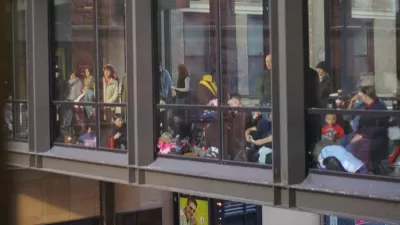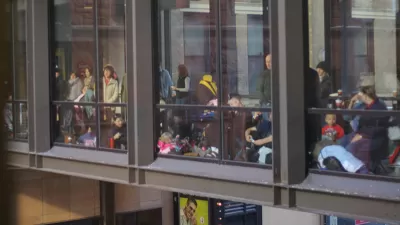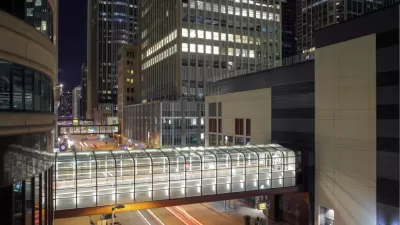The debate over public safety in Downtown St. Paul is once again focused on the city's skyways. There, concerns about access challenge any possible solutions.

A fight over Downtown St. Paul's skyways is also a fight for the "future of downtown itself, according to an article by Peter Callaghan.
The owner of the Railroader Printing Building began locking the public out of the skyway it shares with several other buildings on E. 6th Street hours in March. The owner, Jaunae Brooks, is also petitioning the city council for permission to make the change permanent, reports Callaghan.
Her reasons? As Brooks explained in a lengthy letter to the city, she thinks people who misuse the system are putting her tenants and the public at risk. “The homeless have been literally living in my skyway for the past few years, suitcases and all,” she wrote. “They sleep naked and clothed, cook on hot plates, eat, poop and pee, smoke cigarettes and pot creating a fire hazard, drink alcohol, have sex leaving used condoms behind, use drugs intravenously and leave needles behind, litter and vandalize my property daily.”
There has been no shortage of opposition to the petition, including from the Skyway Governance Advisory Committee, disability advocates, local residents and workers, and city officials. The concern is the precedent closing the skyway early would set for the legal agreement between private building owners and the city about the use of St. Paul's skyways.
The controversy over this particular skyway is set against a context of a downtown revitalization that means the skyways around downtown are busier and more active than ever. Some even blame the rising incidences of public safety concerns in the skyways (which Planetizen last documented in May 2016) on some of the amenities that have opened up in recent years around Downtown St. Paul, like the Central Station of the Green Line.
FULL STORY: Why a dispute over skyway hours is really a fight over the future of downtown St. Paul

Maui's Vacation Rental Debate Turns Ugly
Verbal attacks, misinformation campaigns and fistfights plague a high-stakes debate to convert thousands of vacation rentals into long-term housing.

Planetizen Federal Action Tracker
A weekly monitor of how Trump’s orders and actions are impacting planners and planning in America.

In Urban Planning, AI Prompting Could be the New Design Thinking
Creativity has long been key to great urban design. What if we see AI as our new creative partner?

How Trump's HUD Budget Proposal Would Harm Homelessness Response
Experts say the change to the HUD budget would make it more difficult to identify people who are homeless and connect them with services, and to prevent homelessness.

The Vast Potential of the Right-of-Way
One writer argues that the space between two building faces is the most important element of the built environment.

Florida Seniors Face Rising Homelessness Risk
High housing costs are pushing more seniors, many of them on a fixed income, into homelessness.
Urban Design for Planners 1: Software Tools
This six-course series explores essential urban design concepts using open source software and equips planners with the tools they need to participate fully in the urban design process.
Planning for Universal Design
Learn the tools for implementing Universal Design in planning regulations.
Gallatin County Department of Planning & Community Development
Heyer Gruel & Associates PA
JM Goldson LLC
City of Camden Redevelopment Agency
City of Astoria
Transportation Research & Education Center (TREC) at Portland State University
Jefferson Parish Government
Camden Redevelopment Agency
City of Claremont




























